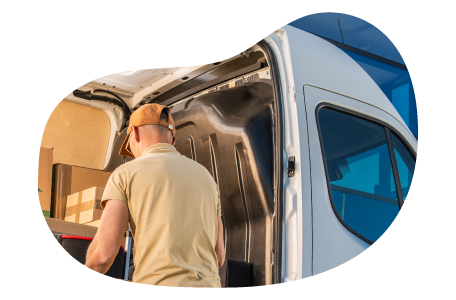

Hired and non-owned auto insurance
Hired and non-owned auto insurance
Hired and non-owned auto insurance (HNOA) provides liability protection for personal, rented, and leased vehicles that a company or freelancer uses for business purposes.
Why do you need hired and non-owned auto insurance?
State laws require commercial auto insurance for business-owned vehicles – but small companies often rely on vehicles they don't own. If your business uses personal, rented, or leased vehicles, hired and non-owned auto insurance (HNOA) can help.
HNOA protects against lawsuits from accidents involving personal, rented, and leased vehicles used for work purposes.
You can usually add it as an endorsement to your general liability insurance, business owner’s policy (BOP), or commercial auto insurance.
You may think carrying personal auto insurance is enough. However, personal auto policies won't cover lawsuits related to business use.
If you get into an accident while driving your personal vehicle for work, your personal auto policy will cover the damage to your vehicle only. You could be sued and have to pay for damages and legal expenses out of pocket.

Small businesses that purchase hired and non-owned auto:
- Rely on employees’ personal vehicles
- Rent vehicles
- Lease vehicles
- Occasionally send employees on work errands
What does hired and non-owned auto insurance cover?
HNOA provides liability coverage when someone sues over an accident involving a personal, rented, or leased vehicle used by your business.
In other words, you'll be protected if someone sues over injuries or other damages from the accident. However, this policy won't cover vehicle repairs.
Unlike commercial auto insurance, hired and non-owned auto insurance doesn't cover collision damage. You'll need a separate policy for collision.
Bodily injury liability
When you add commercial umbrella insurance (or excess liability insurance) to a general liability policy, it helps pay for medical expenses or legal expenses if someone injures themselves on your business’s property.
Property damage liability
HNOA covers your legal costs when a personal, rented, or leased vehicle used by your business is involved in an accident and damages another person's property.
How much does hired and non-owned auto insurance cost?

The cost of a HNOA policy is based on a few factors, including:
- Number of vehicles
- Vehicle value
- Level of risk
- Claims history
- Employee driving records
- Policy deductible and limits
How does hired auto insurance work?
Many businesses add hired and non-owned auto coverage to their general liability insurance policy. You can also purchase HNOA insurance separately, but sometimes buying the policies together can lower your insurance rates.
If your small business has higher than average non-owned auto liabilities, you can increase your coverage limit with commercial umbrella insurance. Umbrella insurance increases your maximum policy limit, meaning your insurance company can cover more expensive lawsuits.
Who needs HNOA insurance?
Non-owned auto insurance benefits a variety of small business owners that utilize personal, leased or rented vehicles for their business.
You might consider a HNOA insurance policy if:
You or your workers use a personal car
Small businesses often need this coverage without realizing it. You might not think it’s a big deal to occasionally ask employees to use their own vehicles for work errands. But that can lead to auto liability issues.
For example, an employee might be involved in an accident while driving their own car to meet a client. Because personal auto insurance doesn’t cover work driving, the other party could sue to recoup medical expenses or repair costs.
You're an independent contractor or self-employed
If you're an independent contractor or self-employed, your personal auto insurance won't provide protection if you're in an accident while completing a work errand. HNOA insurance would provide the same coverage to you as if you're an employee.
You rent vehicles
If your business rents vehicles, including trucks or vans, HNOA insurance would protection for your rented automobiles.
For example, if you or an employee has an accident while driving a rental car during a delivery run, HNOA insurance covers the costs of any resulting lawsuits.
Find commercial auto insurance requirements in your state

What does non-owned auto insurance not cover?
While non-owned auto insurance does provide coverage for several liabilities, it does not provide all the protection that a small business might need.
For instance, a HNOA policy does not cover:
Vehicle damage
You can choose between two types of auto insurance coverage that pay for physical damage or replacement of your vehicle:
- Collision coverage covers the cost of damage to a vehicle when it's in an accident.
- Comprehensive coverage protects the vehicle in other incidents, such as theft, vandalism, or fire.
HNOA does not include either coverage. However, you can add them to commercial auto insurance and personal auto insurance policies.
Employee injuries
Workers' compensation insurance covers employee injuries, including injuries from on-the-job auto accidents.
For example, an employee for an IT staffing agency, is driving a rental vehicle to get from the airport to a conference. Another driver misses a stop sign and hits the employee's vehicle, giving them a concussion.
The IT staffing agency's workers' compensation insurance policy covers the cost of the ambulance ride and emergency room visit.

Other common questions about HNOA insurance
How do you get a certificate of insurance?
TechInsurance is a trusted insurance expert for all small business owners, including contractors and consultants, with extensive knowledge of the IT sector. Our licensed insurance agents are available to answer your questions and help you find the coverage that's right for your business needs.
With TechInsurance, you can easily download a certificate of liability insurance for your small business, often on the same day you buy umbrella coverage or another insurance product.
This comes in handy for companies and consultants that need proof of insurance to sign a contract or a lease and don’t have time to call an insurance company for documentation. Clients and landlords may ask for a certificate of HNOA insurance or other types of business insurance to show you’re insured.
How is HNOA insurance different from personal auto insurance?
Personal auto insurance policies only cover claims related to personal use, including your commute and travel unrelated to work. They have lower limits and usually cost less.
If you’re involved in an accident while driving your personal car for work, your insurance company might refuse your claim. That’s why small business owners who own a car used for work should consider commercial auto insurance or HNOA coverage. If you’re uncertain which policy you need, check with an insurance agent.
What are HNOA insurance limits?
HNOA insurance limits can be defined as the maximum amount of money your insurance company will pay. These limits are set when purchasing your HNOA policy and often match the limits of your general liability policy.
Among TechInsurance policyholders, the average limit is $1 million for auto insurance.